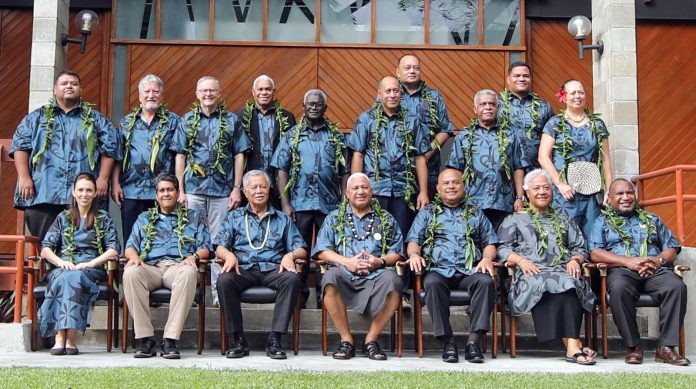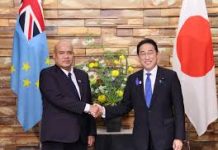By John Braddock
After four days of talks on 14 July, the leaders of 14 Pacific nations emerged from the Pacific Islands Forum (PIF) summit in Fiji declaring “unity.” They launched their “2050 Blue Pacific” strategy, covering the climate crisis, security and political governance.
Led by the regional imperialist powers, Australia and New Zealand, “unity,” “regionalism” and the “Pacific family” have been assiduously promoted to push back against Beijing’s presence following a tour of the region by Chinese Foreign Minister Wang Yi.
Wang’s visit had included the formalisation of a security deal with Solomon Islands and the signing of multiple separate agreements with almost a dozen Pacific countries.
In reality, the PIF was less than unified. Kiribati pulled out amid ongoing bitterness over the secretary-general’s post, while several other leaders did not attend for various reasons. Solomon Islands Prime Minister Manasseh Sogavare came under intense pressure to confirm a previous promise there would be no permanent Chinese military base in his country.
Speaking after the summit, New Zealand Prime Minister Jacinda Ardern declared that the leaders had a “unity of voice” on the “notion of peace and stability and family first.” She said climate was a principal focus of the talks, with money and implementation plans to follow.
On the surface, this was a stark contrast to the last in-person Forum, held in 2019 prior to the global COVID-19 crisis. That summit’s communiqué only passed with a qualification that not all countries supported a call by small Pacific nations for an immediate global ban on new coal-fired power plants and coal mines, and to rapidly phase out the use of coal in the power sector.
After an acrimonious eight-hour dispute, then Australian Prime Minister Scott Morrison had succeeded in expunging any specific commitments to limit temperature rises to no more than 1.5 degrees centigrade above pre-industrial levels. Fiji’s Prime Minister Frank Bainimarama bitterly slammed Morrison for “alienating” Pacific leaders and warned that by imposing Canberra’s agenda it would push them closer to China, adding “the Chinese don’t insult us.”
This time, the PIF’s “2050 Strategy for the Blue Pacific Continent” was endorsed by all Pacific leaders. At nearly 4,000 words, the diplomatic document is vague. It concentrates heavily on security, criticising “external powers seeking to assert their own interests”—a clause very likely demanded by Canberra and Wellington.
The statement repeatedly calls for accelerated and drastic action to reduce emissions. It emphasises that the Pacific is “at the frontline of the adverse impacts of climate change.” Current and future disaster impacts include extreme weather events, cyclones, drought, flooding, sea level rise and ocean acidification.
The strategy identifies issues related to “accessing international funding for climate change and disasters; the continued use of inefficient energy; and inadequate access to safe drinking water and sanitation, food security, maritime boundaries, human rights, and cultural preservation.”
The summit’s communiqué, released some days later, said: “Leaders declared that the Pacific is facing a climate emergency that threatens the livelihoods, security and wellbeing of its people and ecosystems, backed by the latest science and the daily lived realities in Pacific communities.” The statement backed Vanuatu’s campaign for the International Court of Justice to consider whether inaction on climate should be considered a breach of human rights.
PIF chairman Bainimarama told reporters: “We simply cannot settle for anything less than the survival of every Pacific Island country—and that requires that all high emitting economies implement science-based plans to decisively reduce emissions in line with the Paris Agreement’s 1.5-degree temperature threshold.” He named Australia, New Zealand, the US, India, the European Union and China as “high emitting countries.”
The communiqué praised the Australian government’s limited move to lift that country’s emissions reduction target. Prime Minister Anthony Albanese said the Pacific had “overwhelmingly” welcomed his Labor government’s promise to cut emissions by 43 percent by 2030. Albanese claimed that none of the leaders he had met had pressed him to phase out new oil and gas projects.
Bainimarama, however, said on social media he had urged Albanese to introduce more ambitious targets consistent with limiting warming to 1.5 degrees. Palau also called out Australia for falling short of the target. Asked what justification he would give Pacific leaders about his government not ruling out new coal and gas projects, Albanese flatly refused to answer, saying it was a “hypothetical question.”
Sydney Morning Herald (SMH) political editor Peter Hartcher lauded Albanese’s “triumphal Pacific debut” at the PIF. While conceding that Pacific governments wanted Australia to do more on climate, Albanese had, Hartcher claimed, effectively sidelined China, which will continue increasing emissions until 2030. Previously, Australia’s position as a “climate pariah among rich nations” had given “everyone from Shanghai to Samoa licence to attack it,” Hartcher complained.
Attempts to glorify Australia’s emissions reduction target are fraudulent. Analysis by the climate activist group the Sunrise Project, cited by the Guardian, found decisions are looming for approvals of up to 27 coal mining developments—13 greenfield coalmines and 14 extensions of existing mines. Tuvalu’s Foreign Minister Simon Kofe warned such developments would put Australia at odds with Pacific Island countries.
The SMH reported that according to scientific experts, Labor’s climate target was not based on the best scientific and economic advice. It fell short of Australia’s already limited commitment to the Paris Agreement, would lead to more severe damage from global warming and cost the economy more than deeper, earlier pollution cuts would. Think tank Climate Analytics found that, if applied internationally, the Albanese government’s planned emissions reductions would cause average global temperature to rise above 2 degrees.
Albanese has made it clear, especially to big business, that he has no plans to be more ambitious or to act urgently. “This [43 percent target] is a floor, not a ceiling,” he vaguely declared, reprising hollow promises by his predecessor Morrison.
Meanwhile New Zealand’s emissions, mainly from intense dairy production, are increasing under the Ardern Labour-Green Party government.
Disasters are already occurring across the Pacific. Kofe addressed the Glasgow climate summit last year while standing knee-deep in the rising waters of Tuvalu. Kiribati, less than 2 metres above sea level, is experiencing flooding, contamination of water sources and food scarcity. The Cook Islands, American Samoa and French Polynesia were all hit last week by king tides and swells, causing substantial damage.
After the summit, Ardern told the Fiji Times her government would commit half of its $1.3 billion in climate finance to Pacific Island nations vulnerable to climate change-induced disasters. Ardern linked the funding to Labour’s “foreign policy focus,” calling on the small island nations to work together with New Zealand “to make sure that we can rely on a rules-based order.”
Upholding the “rules-based order”—that is, the post-World War II order dominated by the US—means committing to the US-led confrontation with China and preparation for war. That is the price the Pacific states are being told to pay for even token action on climate change by the former colonial powers.
SOURCE: WSWS/PACNEWS


















